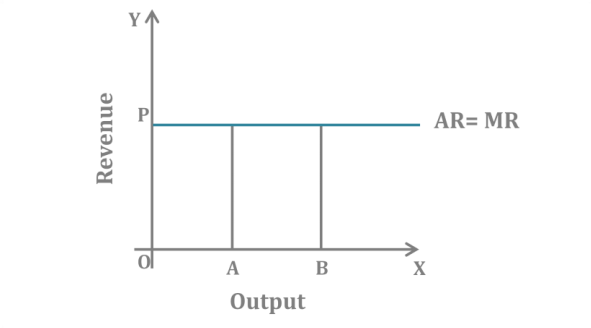Perfect competition is a form of market where there are a large number of buyers and sellers of a commodity. A homogeneous product is sold in the market. An individual firm has no control over the price. It is a price taker.
Features of Perfect Competition
- Large number of sellers and buyers: The number of firms selling a particular commodity is so large that any increase or decrease in supply by an individual firm hardly impacts the total supply. So, an individual firm fails to impact the price of the commodity in the market. It can sell any amount at the existing price of the commodity. Hence, a firm under perfect competition is a price taker. Even the number of buyers is large, and hence, an individual buyer is also unable to influence the price of the commodity.
- Homogeneous products: All sellers sell identical units of a product. The existence of identical products implies the same price for the product in a competitive market. Hence, buyers have no reason to prefer the product of one seller compared to that of another.
- Free entry and exit of firms: A firm can easily enter and exit any industry as there is no legal restriction. Whenever there are abnormal profits, new firms will enter the industry and whenever there are losses, few existing firms will exit the industry. This situation is possible only in the long run.
- Perfect knowledge: Buyers are aware of the price prevailing in the market. Also, they are aware that the homogeneous product is being sold by all the firms at uniform price.
- Perfect mobility: Factors of production are perfectly mobile. They will move to that industry where they get the best price.
- Absence of selling cost: Selling costs are the costs incurred by a firm to promote its sale. The seller can sell any amount of commodity at the existing price, and hence, selling costs are not required.
- No transport cost: For one price to prevail throughout the market, it is essential that there is no extra transport cost for consumers while buying a commodity from the sellers.
A Firm under Perfect Competition is a Price Taker, not a Price Maker
Under perfect competition, there are a large number of firms producing homogeneous commodities. In this market condition, an individual firm cannot change the price of the commodity. Price is determined by the forces of market demand and supply. All the firms in the industry sell their output at the given price. Hence, a firm under perfect competition is a price taker.
Demand Curve of a Firm under Perfect Competition
The demand curve of the firm under perfect competition is perfectly elastic. It means that the firm can sell any amount of the commodity at the prevailing price. A firm’s demand curve is indicated by a horizontal line parallel to the X-axis. This shows that the firm is to accept the price as determined by the forces of the market supply and market demand.

The diagram shows that at the given price level OP, the firm can sell any quantity of the commodity it produces. Price remains constant whether the quantity demanded is OA or OB or even zero.
Related Articles
Market – Definition, Structure of Market
Nature and Structure of Markets
What is Oligopoly? | Definition, Types, Examples of Oligopoly
What is Monopoly? | Definition and Features of Monopoly
Monopolistic competition | Definition, Features of Monopolistic competition
What is Perfect Competition? | Definition, Features of Perfect Competition
You May Read
Follow us
Comments are closed.